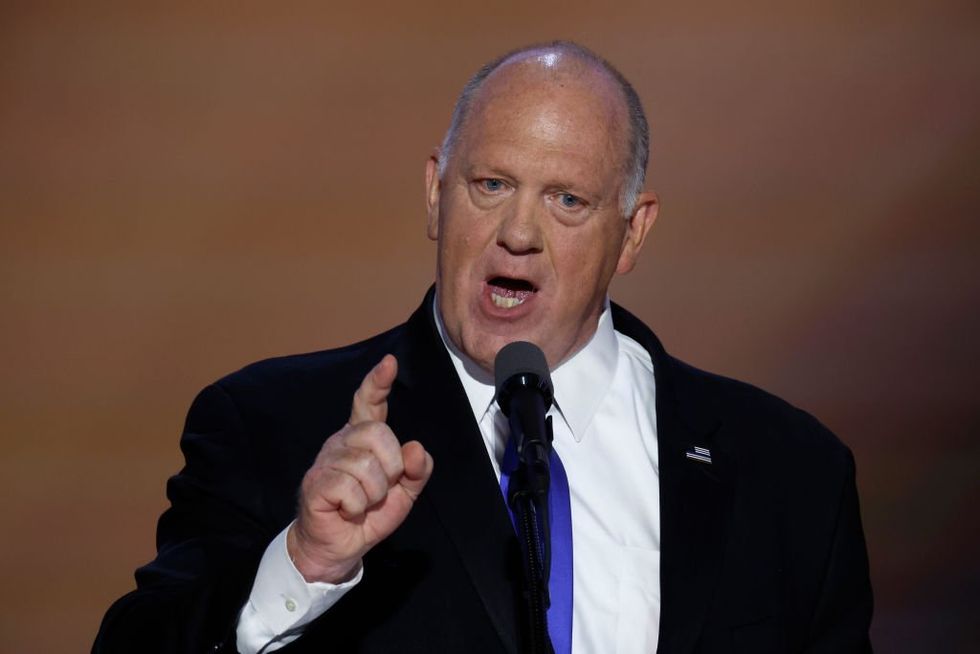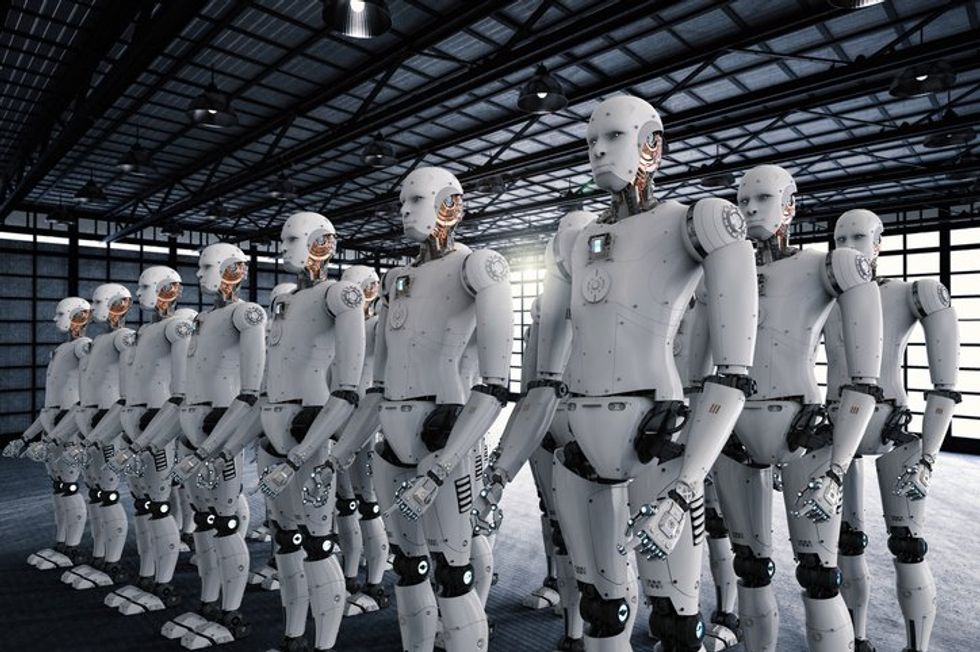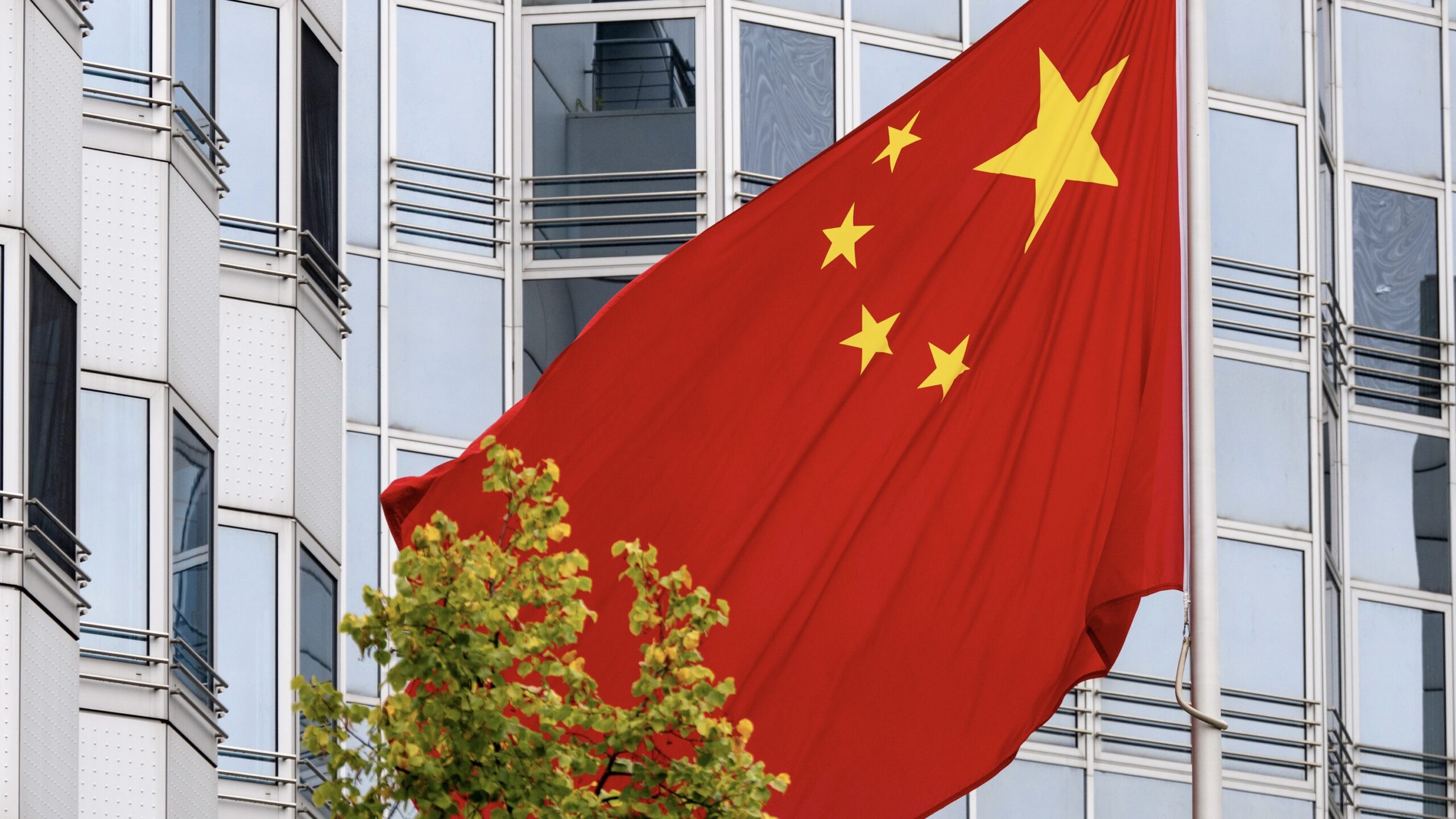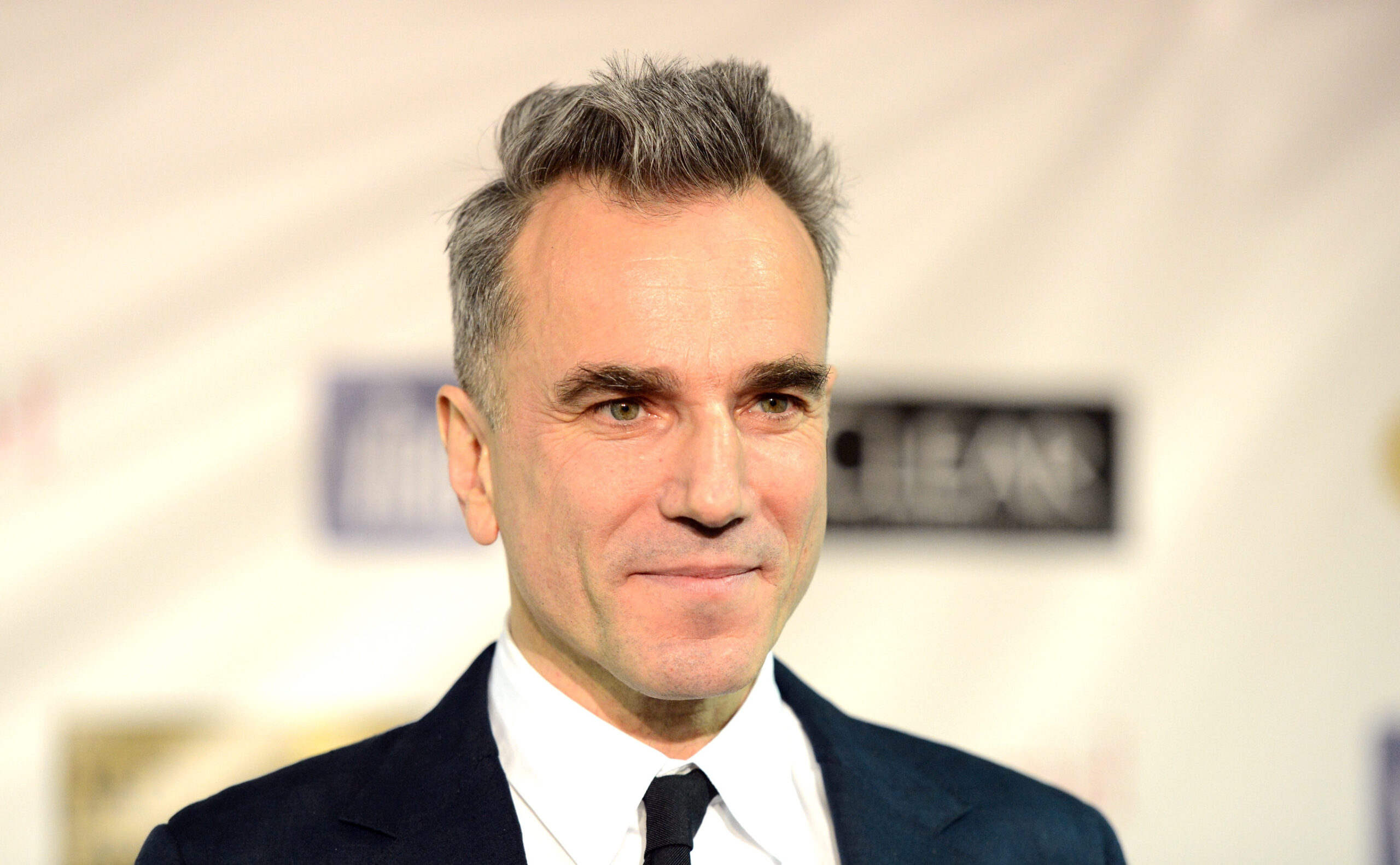Damning report: Top agent kept credible threat against Trump secret ahead of Butler rally
The lead U.S. Secret Service advance agent for the July 13 Donald Trump rally in Pennsylvania learned three days before the event about “credible intelligence” of a threat to the former president but didn’t inform the special agent in charge of the Pittsburgh Field Office or share that information on the event’s preliminary survey document, a new U.S. Senate report reveals. The Pittsburgh special agent in charge told Senate investigators that if he had been made aware of intelligence about a threat, he “might have pushed for the event to be moved indoors if it was deemed too risky for an outdoor venue,” according to a preliminary report on the assassination attempt against Trump at the fairgrounds in Butler, Pennsylvania. “Despite learning on July 9 that based on ‘credible intelligence’ of a threat USSS counter-snipers assets would be provided for the July 13 rally, the lead advance agent wrote in the intelligence section of the preliminary survey document that, ‘At this time, no adverse intelligence has been developed concerning this visit,’” read the Sept. 25 report from the Senate Committee on Homeland Security and Governmental Affairs. 'He would have requested more assets if he had received this information.' The lead advance agent told Senate investigators that “there was no adverse intelligence to pass on [to] ... the group as a whole,” and that’s why it was not noted on the survey form. However, the Pittsburgh SAIC told the committee “that it would be his expectation that any credible threat or intelligence would appear in the ‘intelligence’ section in the preliminary survey,” the report said. “Additionally, the SAIC told the committee that he would have requested more assets if he had received this information,” the report said. Trump was speaking before a large crowd at the Butler Farm Show Inc. fairgrounds on July 13 when would-be assassin Thomas Matthew Crooks opened fire with a rifle from a nearby roof, striking Trump in the right ear, killing a volunteer firefighter, and seriously wounding two other event attendees. In the wake of the assassination attempt, close to a dozen investigations have been opened by Congress, the FBI, the Department of Homeland Security Office of Inspector General, the Pennsylvania State Police, and the U.S. House Task Force on the Attempted Assassination of Donald J. Trump. Poor communications and lack of coordination between the Secret Service and local law enforcement have been cited as major problems at the July rally. Advance personnel identified “multiple” problems with the line of sight to the event stage and recommended positioning large trucks or heavy equipment between the stage and nearby buildings, but this safety measure was ultimately not used, the report said. A SWAT operator looks to access the roof of the American Glass Research building after the July 13 shooting of former President Donald J. Trump in Butler, Pennsylvania. Butler Township Police Department via Judicial Watch When interviewed by Senate committee investigators on Aug. 30, the SAIC said he did not know why counter-snipers were assigned to work the July 13 Trump event. It was the first time the Secret Service had assigned counter-snipers to an event that didn't involve the president, vice president, or a nominated candidate for president, the Secret Service has said. On July 9, the lead U.S. Secret Service agent received a phone call from a supervisor in the Trump detail who said there was “credible intelligence that he could not speak about” that prompted the decision to assign counter-snipers to the July 13 Trump event, the report said. “The lead advance agent asked that this information be relayed to the SAIC of the Pittsburgh Field Office, but it never was,” the report said. “USSS has not provided the Committee with any information confirming that this information was ever shared with any other USSS personnel responsible for planning the July 13 rally, including the USSS Site Agent, USSS Counter Assault Team, Site Counterpart, Intelligence Advance Agent, Technical Security Division (TSD) Advance, or the C-UAS Advance Agent, or any state or local law enforcement officials.” The Secret Service advance intelligence agent for the July 13 event said he was not given any information on specific threats and did not know why counter-snipers had been assigned to the rally, the report said. This agent contacted the FBI on July 10 requesting “any intelligence related to former President Trump and the July 13 rally in Butler, PA.” “The FBI did not respond to this intelligence request,” the report said. Among the biggest security failures at the July 13 event was the failure to cover the extensive roof system of the American Glass Research complex just north of the stage, the report said. Local law enforcement raised this issue days in advance, but Secret Service planning documents did not include post-standers or patrols to cover the roof. 'Wha
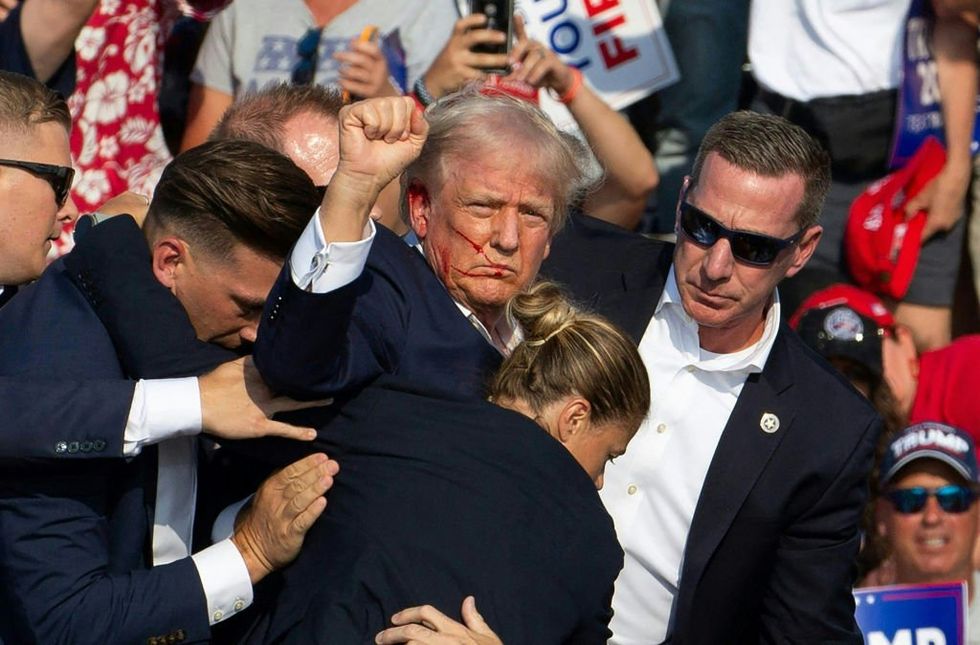

The lead U.S. Secret Service advance agent for the July 13 Donald Trump rally in Pennsylvania learned three days before the event about “credible intelligence” of a threat to the former president but didn’t inform the special agent in charge of the Pittsburgh Field Office or share that information on the event’s preliminary survey document, a new U.S. Senate report reveals.
The Pittsburgh special agent in charge told Senate investigators that if he had been made aware of intelligence about a threat, he “might have pushed for the event to be moved indoors if it was deemed too risky for an outdoor venue,” according to a preliminary report on the assassination attempt against Trump at the fairgrounds in Butler, Pennsylvania.
“Despite learning on July 9 that based on ‘credible intelligence’ of a threat USSS counter-snipers assets would be provided for the July 13 rally, the lead advance agent wrote in the intelligence section of the preliminary survey document that, ‘At this time, no adverse intelligence has been developed concerning this visit,’” read the Sept. 25 report from the Senate Committee on Homeland Security and Governmental Affairs.
'He would have requested more assets if he had received this information.'
The lead advance agent told Senate investigators that “there was no adverse intelligence to pass on [to] ... the group as a whole,” and that’s why it was not noted on the survey form. However, the Pittsburgh SAIC told the committee “that it would be his expectation that any credible threat or intelligence would appear in the ‘intelligence’ section in the preliminary survey,” the report said.
“Additionally, the SAIC told the committee that he would have requested more assets if he had received this information,” the report said.
Trump was speaking before a large crowd at the Butler Farm Show Inc. fairgrounds on July 13 when would-be assassin Thomas Matthew Crooks opened fire with a rifle from a nearby roof, striking Trump in the right ear, killing a volunteer firefighter, and seriously wounding two other event attendees.
In the wake of the assassination attempt, close to a dozen investigations have been opened by Congress, the FBI, the Department of Homeland Security Office of Inspector General, the Pennsylvania State Police, and the U.S. House Task Force on the Attempted Assassination of Donald J. Trump.
Poor communications and lack of coordination between the Secret Service and local law enforcement have been cited as major problems at the July rally.
Advance personnel identified “multiple” problems with the line of sight to the event stage and recommended positioning large trucks or heavy equipment between the stage and nearby buildings, but this safety measure was ultimately not used, the report said.
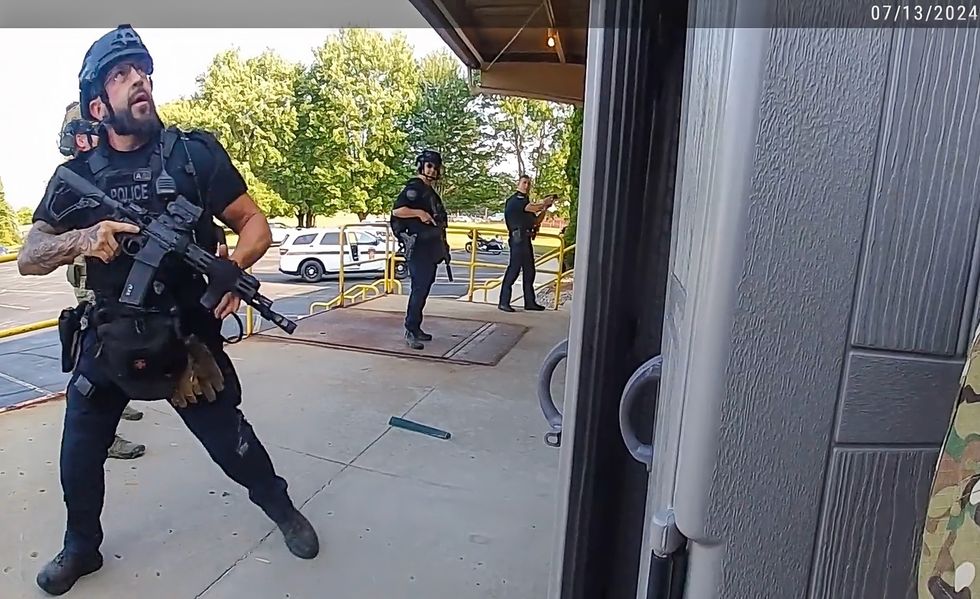 A SWAT operator looks to access the roof of the American Glass Research building after the July 13 shooting of former President Donald J. Trump in Butler, Pennsylvania.
Butler Township Police Department via Judicial Watch
A SWAT operator looks to access the roof of the American Glass Research building after the July 13 shooting of former President Donald J. Trump in Butler, Pennsylvania.
Butler Township Police Department via Judicial Watch
When interviewed by Senate committee investigators on Aug. 30, the SAIC said he did not know why counter-snipers were assigned to work the July 13 Trump event. It was the first time the Secret Service had assigned counter-snipers to an event that didn't involve the president, vice president, or a nominated candidate for president, the Secret Service has said.
On July 9, the lead U.S. Secret Service agent received a phone call from a supervisor in the Trump detail who said there was “credible intelligence that he could not speak about” that prompted the decision to assign counter-snipers to the July 13 Trump event, the report said.
“The lead advance agent asked that this information be relayed to the SAIC of the Pittsburgh Field Office, but it never was,” the report said.
“USSS has not provided the Committee with any information confirming that this information was ever shared with any other USSS personnel responsible for planning the July 13 rally, including the USSS Site Agent, USSS Counter Assault Team, Site Counterpart, Intelligence Advance Agent, Technical Security Division (TSD) Advance, or the C-UAS Advance Agent, or any state or local law enforcement officials.”
The Secret Service advance intelligence agent for the July 13 event said he was not given any information on specific threats and did not know why counter-snipers had been assigned to the rally, the report said. This agent contacted the FBI on July 10 requesting “any intelligence related to former President Trump and the July 13 rally in Butler, PA.”
“The FBI did not respond to this intelligence request,” the report said.
Among the biggest security failures at the July 13 event was the failure to cover the extensive roof system of the American Glass Research complex just north of the stage, the report said. Local law enforcement raised this issue days in advance, but Secret Service planning documents did not include post-standers or patrols to cover the roof.
'What happened on July 13 was an accumulation of errors that produced a perfect storm of stunning failure.'
Secret Service officials did not go inside the AGR building during planning for the event and failed to sweep the complex before the rally on July 13, the report said. The site agent said because the AGR building was outside the secure perimeter, “we did not discuss or plan for having a post-stander or having any other asset than the local counter-sniper.”
Shortly before Crooks opened fire on the event, a Secret Service counter-sniper saw local law enforcement officers running toward the AGR building with guns drawn but did not alert Trump's protective detail to remove him from the stage, the report said. The sniper told investigators that the idea of removing Trump from stage “did not cross my mind.”
The Secret Service failed to get its counter-drone system operational until 4:33 p.m. because the inexperienced agent in charge of the system spent "several hours” on the phone with technical support. Tech support suggested that the agent replace an ethernet cable between two components, but he did not have a spare and had to obtain one from the Trump campaign, the report said.
Sen. Rand Paul (R-Ky.), ranking member of the Homeland Security Committee, called the Secret Service failures on July 13 “inexcusable.”
“Our initial findings clearly show a series of multiple failures of the U.S. Secret Service (USSS) and an inexcusable dereliction of duty,” Paul said.
Sen. Richard Blumenthal (D-Conn.) said the preliminary report underscores the need for reform of the Secret Service.
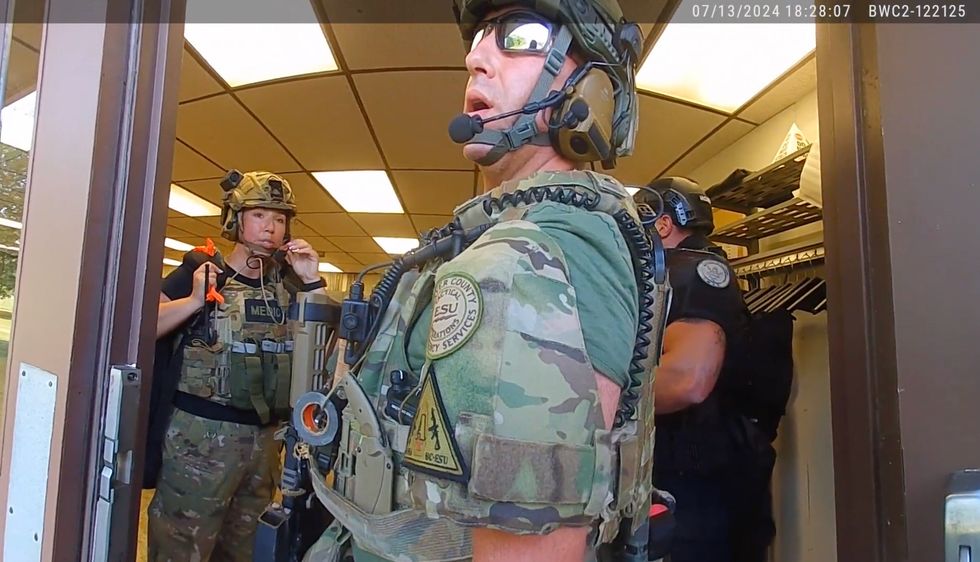 A Beaver County Emergency Services SWAT operator and a medic enter the building from which Thomas Crooks shot former President Donald J. Trump at a rally July 13 in Butler, Pennsylvania.
Butler Township Police Department via Judicial Watch
A Beaver County Emergency Services SWAT operator and a medic enter the building from which Thomas Crooks shot former President Donald J. Trump at a rally July 13 in Butler, Pennsylvania.
Butler Township Police Department via Judicial Watch
“What happened on July 13 was an accumulation of errors that produced a perfect storm of stunning failure,” Blumenthal said, according to the committee website. “It was a tragedy and completely preventable from the outset. There was both a failure to provide resources — like a working radio, drone detection system, or counter surveillance team — and lack of an effective chain of command.”
Sen. Ron Johnson (R-Wis.), ranking member of the Permanent Subcommittee on Investigations, said the Senate needs to use stronger means to ensure better cooperation from federal law enforcement and other agencies.
“Federal agencies like the Secret Service, FBI, and DOJ continue to withhold records that are vital to this committee’s work,” Johnson said. “There is still much more information that the public and Congress deserve to know.
“Going forward, this committee must be prepared to use compulsory process to ensure that the American people have a complete and thorough understanding of the security failures that resulted in the multiple attempts on former President Trump’s life.”
Like Blaze News? Bypass the censors, sign up for our newsletters, and get stories like this direct to your inbox. Sign up here!
Originally Published at Daily Wire, World Net Daily, or The Blaze
What's Your Reaction?


















